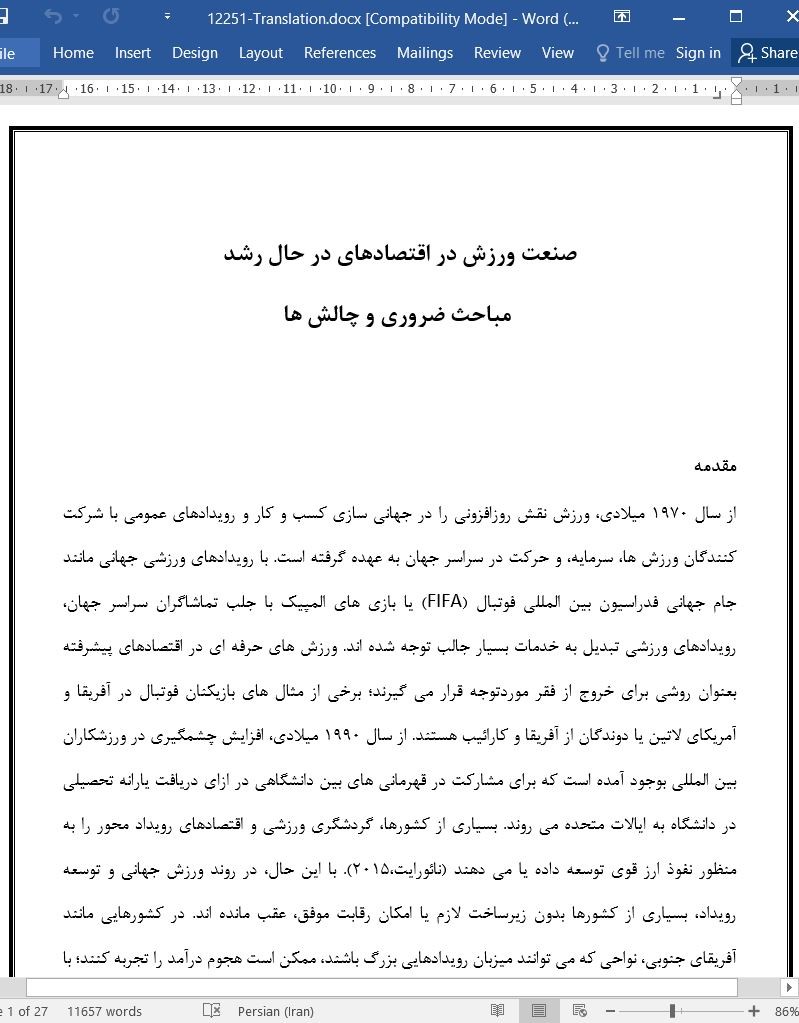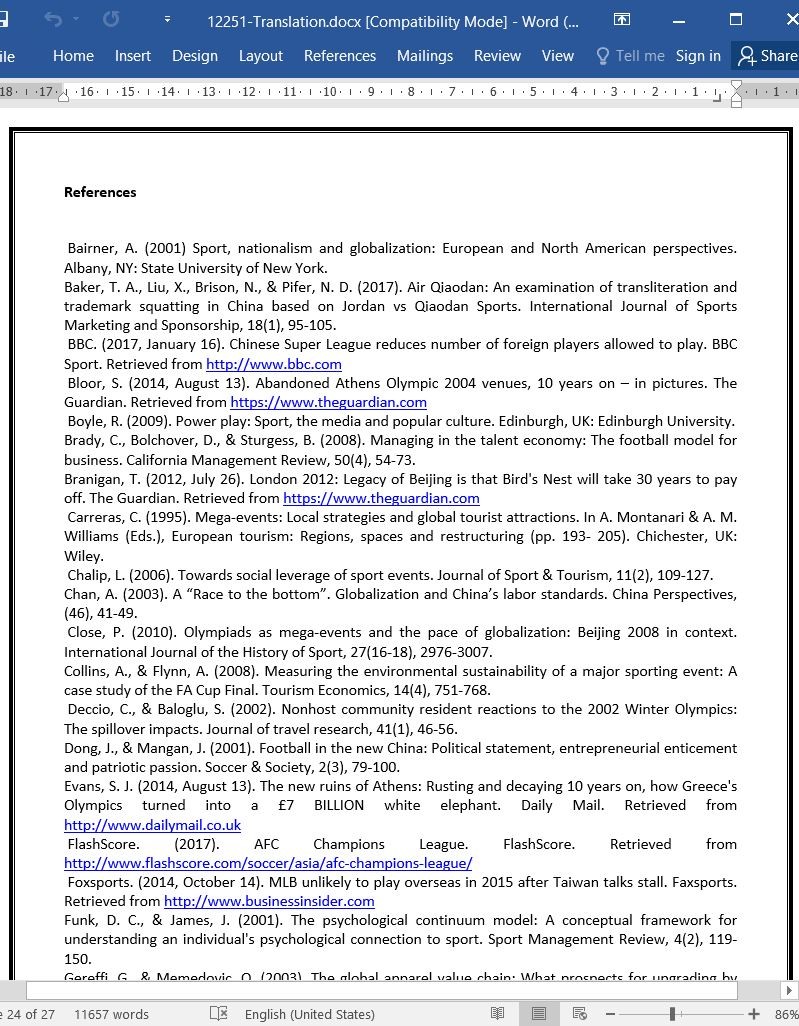
صنعت ورزش در اقتصادهای در حال رشد: مباحث ضروری و چالش ها
مقدمه
از سال 1970 میلادی، ورزش نقش روزافزونی را در جهانی سازی کسب و کار و رویدادهای عمومی با شرکت کنندگان ورزش ها، سرمایه، و حرکت در سراسر جهان به عهده گرفته است. با رویدادهای ورزشی جهانی مانند جام جهانی فدراسیون بین المللی فوتبال (FIFA) یا بازی های المپیک با جلب تماشاگران سراسر جهان، رویدادهای ورزشی تبدیل به خدمات بسیار جالب توجه شده اند. ورزش های حرفه ای در اقتصادهای پیشرفته بعنوان روشی برای خروج از فقر موردتوجه قرار می گیرند؛ برخی از مثال های بازیکنان فوتبال در آفریقا و آمریکای لاتین یا دوندگان از آفریقا و کارائیب هستند. از سال 1990 میلادی، افزایش چشمگیری در ورزشکاران بین المللی بوجود آمده است که برای مشارکت در قهرمانی های بین دانشگاهی در ازای دریافت یارانه تحصیلی در دانشگاه به ایالات متحده می روند. بسیاری از کشورها، گردشگری ورزشی و اقتصادهای رویداد محور را به منظور نفوذ ارز قوی توسعه داده یا می دهند (نائورایت،2015). با این حال، در روند ورزش جهانی و توسعه رویداد، بسیاری از کشورها بدون زیرساخت لازم یا امکان رقابت موفق، عقب مانده اند. در کشورهایی مانند آفریقای جنوبی، نواحی که می توانند میزبان رویدادهایی بزرگ باشند، ممکن است هجوم درآمد را تجربه کنند؛ با این حال، بیشتر آنها به نواحی خارجی کشور دست نمی یابند (گیامپیکولی و نائورایت، 2017).
روند نمایش یک فرهنگ در پیشبرد یک رویداد ورزشی و در حین آن رویداد باید بر بازارهای آماده تمرکز کند، بنابراین تقویت کلیشه های مربوط به یک مکان و افراد آن مکان ممکن است مفید باشد یا نباشد. مجموعه گردشگری-رسانه-ورزش (نائورایت، 2004،2015) با تحیک ورزش جهانی چند وجهی می شود، اما در شهرهایی مانند کازان، آلماتی، پکن، سئول، هنگ کنگ، دهلی نو، ریو دوژانیرو، بوینس آیرس، و سایر شهرها که به دنبال میزبانی رویدادهای جهانی مهم هستند، جهانی تر می شود. لیگ های فوتبال در آفریقای جنوبی، کره جنوبی، ژاپن، و از همه بیشتر چین، که همگی بازیکنان جزئی در اواخر قرن بیستم هستند، واردکنندگان اصلی استعدادهای فوتبال از کشورهای دیگر، هستند، بعنوان مثال، سوپر لیگ چین، لیگ برتر اروپا و تیم هایی با بهترین بازیکنان از سراسر جهان را به چالش می کشد. در طول سالهای 1980 و 1990 میلادی، این روند شدت گرفت زیرا دولت ها به طور فزاینده ای مبلغ زیادی پول را به برنامه های ورزشی ملی با هدف موفقیت در صحنه های بین المللی اختصاص دادند.
Introduction
Since the 1970s, sport has assumed an ever-increasing role within the globalization of business and public events with sports participants, capital, and labor moving around the world. With global sport events like the Fédération Internationale de Football Association (FIFA) World Cup of soccer or the Olympic Games capturing world-wide audiences, sports events have become highly sought-after commodities. Professional sports in developed economies are viewed as a pathway out of poverty; some examples are soccer players in Africa and Latin America or runners from Africa and the Caribbean. Since the 1990s, there has been a dramatic increase in international athletes coming to the United States (U.S.) to participate in intercollegiate athletics in exchange for a subsidized university education. Many countries have or are developing sport tourism and event-driven economies in order to increase the influx of hard currency (Nauright, 2015). However, in the process of global sport and event development, many countries are left behind without the necessary infrastructure or visibility to compete successfully. In countries such as South Africa, regions able to host large-scale events may experience an influx of revenue; yet, most of that does not reach peripheral areas of the country (Giampiccoli & Nauright, 2017).
The process of showcasing a culture in the lead-up to a sport event and during the event itself has had to focus on ready-made markets, thus reinforcing stereotypes about a place and its people that may or may not be beneficial. The sport-media-tourism complex (Nauright, 2004, 2015) driving global sport is multifaceted, uneven, but becoming more universal as cities such as Kazan, Almaty, Beijing, Seoul, Hong Kong, New Delhi, Rio de Janeiro, Buenos Aires, and others seek to host major global events. Soccer leagues in South Africa, South Korea, Japan, and most significantly, China, which are all minor players in the latter 20th century, are net importers of soccer talents from other countries; for example, the Chinese Super League is challenging the top European leagues and teams for the best players from around the world. During the 1980s and 1990s, this process intensified as governments increasingly diverted large sums of money into national sporting programs aimed at succeeding on the international stage.
مقدمه
جنبه های سازنده جهانی سازی ورزش
چالش های موجود در بازار جهانی ورزش
تحلیل موردی: MLB در آمریکای لاتین
درباره شماره ویژه
منابع
Introduction
Constructive Aspects of Sport Globalization
Challenges in Globalized Sport Marketplace
Case Analysis: MLB in Latin America
About the Special Issue
References
- اصل مقاله انگلیسی با فرمت ورد (word) با قابلیت ویرایش
- ترجمه فارسی مقاله با فرمت ورد (word) با قابلیت ویرایش، بدون آرم سایت ای ترجمه
- ترجمه فارسی مقاله با فرمت pdf، بدون آرم سایت ای ترجمه


